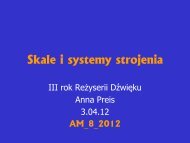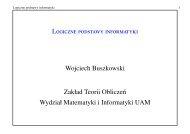Amir Weiner Getting to Know You
Amir Weiner Getting to Know You
Amir Weiner Getting to Know You
You also want an ePaper? Increase the reach of your titles
YUMPU automatically turns print PDFs into web optimized ePapers that Google loves.
GETTING TO KNOW YOU 11<br />
Interrogations were a primary <strong>to</strong>ol for obtaining information. Here,<br />
<strong>to</strong>o, the gap between operational and socio-political knowledge was in full<br />
display. The NKVD officers clearly knew where <strong>to</strong> find their targets but knew<br />
abysmally little about their world, and the little they did know was filtered<br />
through Soviet ideological blinders. The interrogation of Menachem Begin,<br />
the leader of the mass Zionist Beitar movement in Poland and Czechoslovakia<br />
and the future prime minister of Israel, was a case in point. Begin’s interroga<strong>to</strong>rs<br />
“knew for a fact” that his predecessor, Ze’ev (Vladimir) Jabotinsky, was a<br />
“colonel in British intelligence.” They were, however, unaware that the British<br />
had banned Jabotinsky from pre-state Israel and that he was already dead.<br />
This did not deter or embarrass the interroga<strong>to</strong>rs in the least (“Tell me, where<br />
is Jabotinsky now? Jabotinsky is dead. Are you sure? Regrettably, yes. Well,<br />
you see, nobody sheds tears over him”). The interroga<strong>to</strong>rs dismissed Begin’s<br />
statement that he had joined Beitar voluntarily because he liked its program<br />
and that no one recommended him. “Impossible,” uttered the interroga<strong>to</strong>r.<br />
“With us, when a youth wants <strong>to</strong> join the Komsomol, other members<br />
recommend him.” 18<br />
The NKVD was interested in two key questions: the political goals of their<br />
target’s activities and the scope of the network of the target’s collabora<strong>to</strong>rs.<br />
Multiple interrogation stenograms reveal a fixation with extracting confessions<br />
of guilt for counterrevolutionary activities and retracing networks of alleged<br />
conspira<strong>to</strong>rs. Begin’s initial interrogations focused on a detailed account of<br />
his relatives, friends, and associates in Poland and Lithuania. 19 There was,<br />
however, much more <strong>to</strong> it than the simple police method of investigating the<br />
sources and conduct of actual and potential subversions. The mechanisms<br />
of the interview shed light on the very essence of the Soviet surveillance<br />
enterprise.<br />
The terrible thing, reflected Begin, was not the accusations themselves but<br />
the “fact that the interroga<strong>to</strong>rs were not lying <strong>to</strong> themselves. On the contrary,<br />
they were convinced that they had in their hands genuine proof.” 20 Anxiety<br />
over the uncertainty of his fate and that of his young wife was compounded by<br />
successive late-night sessions and sleep deprivation. At least once he was forced<br />
18 Menachem Begin, Beleilot levanim, 2nd ed. with NKVD pro<strong>to</strong>cols (Tel Aviv: Dvir, 1995),<br />
78–80. Ironically, four years later the NKGB was finally aware of Jabotinsky’s death but<br />
marked his place of death as Poland. Jabotinsky actually died and was buried in New York<br />
(LYA f. K-1, ap. 3, b. 177, l. 4).<br />
19 LYA f. K-1, ap. 58, b. R-12544, ll. 13–19, 26–28, 35. The fixation with opponents’<br />
networks was punctuated four years later in a union-wide NKGB report on Beitar that called<br />
on its regional branches <strong>to</strong> keep track of contacts between members of the Zionist organization<br />
in the various Soviet republics and regions (LYA f. K-1, ap. 3, b. 177, l. 2).<br />
20 Begin, Beleilot levanim, 126.

















